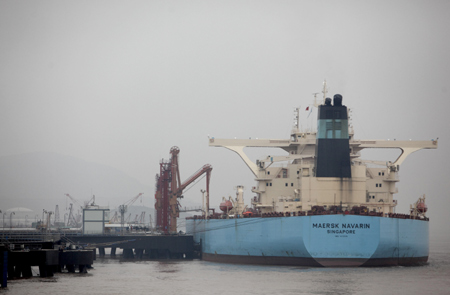Energy
Oil reserve project picks up speed
By Zhou Yan (China Daily)
Updated: 2011-01-26 10:39
 |
Large Medium Small |
|
 |
|
An oil tanker is docked inside China's strategic oil reserve complex in Zhoushan, Zhejiang province. [Photo / Bloomberg] |
BEIJING - China will ratchet up its efforts to construct the second phase of the national crude oil reserve base project in 2011, as part of the country's endeavor to secure strategically important natural resources and stabilize the petroleum market.
"We will accelerate the construction pace of the project and ensure its quality, aiming to put it into operation as early as possible," the National Energy Administration (NEA) said in its annual energy work target for 2011.
The agency, which is under China's top economic planner, the National Development and Reform Commission (NDRC), said that it will strengthen supervision to guarantee the safe operation of oil reserve bases.
"Construction of China's oil reserve bases is under way. The first phase of the project has been completed, and two of the bases belonging to the second phase located in the Xinjiang Uygur autonomous region and Qinghai province have already begun construction," Zhang Guobao, former director of the NEA, said.
Zhang, who stepped down as the director of the bureau last week, urged earlier that China needs to maintain "a certain volume of oil reserves" to ensure energy security, and to continue adding to the amount in reserve.
China proposed a program to establish strategic oil reserve bases in 2004 and took the leap in late 2007 when the NDRC announced the official establishment of a national oil reserve center to accelerate the setting up of the oil reserves bases.
The commission said that the project would require three phases over a total of 15 years for completion.
The first phase, comprising four strategic oil reserve bases in the coastal cities of Dalian, Liaoning province, Qingdao, Shandong province, and Ningbo and Zhoushan in Zhejiang province, have been operational since late 2008 with a total designed volume of 120 million cubic meters, equivalent to 140 million tons of oil.
"Given the strategic importance of oil, the foremost target for setting up the project is to limit economic damage in case of an oil supply disruption," said Dong Xiucheng, a professor at China University of Petroleum.
"The second phase is expected to finish by 2012 with a total of 37.53 million tons of reserve volume," China National Petroleum Corp (CNPC), the country's largest energy company by capital, said in a research note.
CNPC said the second phase of the project would be composed of eight bases, two of which will be located in Zhanjiang, Guangdong province, and Jinzhou, Liaoning province.
According to China's mid- and long-term oil reserve plan approved by the State Council in February 2009, the country will complete the third phase of the project by 2020, establishing a total reserve volume equivalent to 100 days of imports, which may surpass 800 million tons based on estimates by analysts.
| ||||
The nation's oil imports hit 239 million tons in 2010, up 17.5 percent from 2009, according to figures from customs.
China's oil imports reached 55 percent of total oil consumption last year from 10.4 percent in 1996, said CNPC.
The oil producer predicted that foreign oil will make up more than 60 percent of oil demand by 2015, when the nation's consumption will reach 540 million tons, a 18.7 percent increase from 2010.
On the other hand, the NEA said that China's crude oil output had stabilized at 190 million tons annually during the period of the 11th Five-Year Plan (2006-2010).
That indicates that China's oil production capacity has reached a "bottleneck", and may lead to a deeper dependence on imports, said Lin Boqiang, director of the China Center for Energy Economics Research at Xiamen University.
As such, the accelerated development of oil reserve bases will help reduce the damage caused by any interruption of oil imports, analysts said.
| 分享按钮 |

